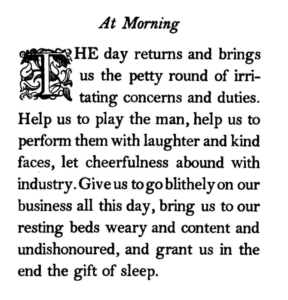Have a drink with: Robert Louis Stevenson
Under the wide and starry sky…
Ask him about: Self-care Sundays
I need a vacation. This makes me think of Robert Louis Stevenson.
If you believe, as I do, that history is an act of community through which we use the experiences of others to learn about ourselves, there can hardly be a better example than Stevenson. Not merely the author of such beloved thrillers as Kidnapped and The Strange Case of Dr. Jekyll and Mr. Hyde, Stevenson was a lifelong traveler and spent the last handful of his 44 years living in Samoa in an effort to lessen the pain and effect of lung disease.
Stevenson set himself up on a jungle estate named Vailima, along with his American wife, Fanny, and a shape-shifting cohort of friends, relatives and locals. He learned the local language and advocated politically for the indigenous population, for whom he held great respect despite the fact that most Europeans’ attitudes towards the islanders ranged from interfering to dismissive (the Europeans were eventually dismissive of Stevenson, too – most regarded his later-life books, which told South Seas tales, as indulgent twaddle compared to his earlier adventure stories). The Samoans, for their part, called Stevenson “Tusitala,” or “teller of tales,” and after his death buried him in a place of honor on the island.
And Stevenson’s best life lessons (aside from being wary of peg-legged pirates and making sure it’s your nice personality who makes the CVS run) have to do with something we all need to do: take a friggin’ break.
In an essay entitled “An Apology for Idlers,” Stevenson comes out as an early opponent of the cult of busy-ness, and his advice, while understandable coming from a chronically ill cocaine aficionado who constantly assumed his check-out date was just around the corner, applies far more broadly: “Extreme busyness, whether at school or college, kirk or market, is a symptom of deficient vitality; and a faculty for idleness implies a catholic appetite and a strong sense of personal identity.”
And not to confuse idleness with plain listless sloth, Stevenson prefers unplanned time for the openness it cultivates, leaving maximum opportunity in a person’s life for serendipity, rest, and the chance to trip on some person or experience that was prior unplanned and possibly very edifying. The author says a good dose of lazing about in the fresh air, of socializing and whiling away the hours is good for cultivating common sense, curiosity and broad-mindedness, allowing for “a great and cool allowance for all sorts of people and opinions.”
It’s hard to read Stevenson’s essay and not think of the knee-jerk compulsion to reach for our smartphones when a moment of boredom approaches, rather than wondering what fruits boredom might in fact bear. The alternative is a numb thrall: “When they do not require to go to the office, when they are not hungry and have no mind to drink, the whole breathing world is a blank to them. If they have to wait an hour or so for a train, they fall into a stupid trance with their eyes open.”
“This does not appeal to me,” the author notes, “as being Success in Life.” He continues, “Look at one of your industrious fellows for a moment, I beseech you. He sows hurry and reaps indigestion; he puts a vast deal of activity out to interest, and receives a large measure of nervous derangement in return. Either he absents himself entirely from all fellowship, and lives a recluse in a garret, with carpet slippers and a leaden ink pot; or he comes among people swiftly and bitterly, in a contraction of his whole nervous system, to discharge some temper before he returns fo work. I do not care how much or how well he works, this fellow is an evil feature in other people’s lives. They would be happier if he were dead.”
The world would not only be more tolerant with some regular time to breathe, he argues, but generally happier: “There is no duty we so much underrate as the duty of being happy. By being happy, we sow anonymous benefits upon the world, which remain unknown even to ourselves, or when they are disclosed, surprise nobody so much as the benefactor.”
To that end: it’s time for a summer break. See you in August.
Fun Facts:
By the way, as relevant in today’s world as the need for rest and tolerance is Stevenson’s insistence that the world is out there for us all to enjoy in common experience: “There is no foreign land; it is the traveller only that is foreign.”
Another of Stevenson’s tender legacies from his time in Samoa is a lovely collection of prayers written for his household, plain expressions of gratitude (and honest acknowledgment of the fact that we could all use less irritation and a good night’s sleep) that show the same open attitude he advocated in the Apology – an attitude, by the way, totally in line with the modern enthusiasm for mindfulness.
Stevenson had an occasionally odd and tumultuous marriage, with his American wife Fanny going so far as to burn the first draft of Dr. Jekyll & Mr. Hyde in frustration. Fanny was no wilting flower: during her life she navigated motherhood (and her philandering first husband) in the frontier American West, trained as an artist in Europe, learned Polynesian cooking while living at Vailima, and was described as a talented, if underused, writer (see page 282, here, for a Scribner’s magazine story she wrote). One biography notes the strength and intensity that so captivated her husband: “Louis used to say of her eyes that her glance was like that of one aiming a pistol—direct, steady, and to some persons rather alarming.”
I understand entirely why 19th century doctors would prescribe a move to the tropics for anyone afflicted with chronic illness. In many ways I think it to be a far more effective and enlightened prescription that modern medicine affords. How must he have felt in his damp Scots soul, a man who needed to live in the moors of his head and the tropical islands of reality? It’s climate dysmorphia, the simultaneous clinging to the stuff of your birth and longing for improbabilities outside yourself.
Additional Reading:
Robert Louis Stevenson, An Apology for Idlers (1877)
Catherine Price, How to Break Up With Your Phone (2018)
Robert Louis Stevenson, A Christmas Sermon, via the Public Domain Review (1900)

